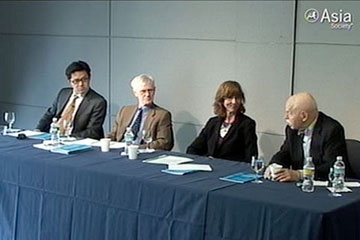The Run-up to Copenhagen

NEW YORK, November 9, 2009 - Barbara Finamore and Alex Wang of the Natural Resources Defense Council (NRDC), Jerome Cohen of the Council on Foreign Relations (CFR), and Orville Schell of Asia Society's Center on U.S.-China Relations met at the Asia Society to discuss U.S.-China environmental policies prior to the Copenhagen climate negotiations in December 2009.
As the two largest economies and the two largest emitters of greenhouse gases, any deal reached at Copenhagen without U.S. or Chinese approval will be largely meaningless in the battle against climate change. While the U.S. is historically responsible for four times the cumulative Chinese emissions, and the per capita level of U.S. emissions still far exceeds the Chinese, China is fast leaving the rest of the world behind in terms of total greenhouse gas production. The two energy behemoths are rich in coal and, despite the rapid development of renewable technologies, still dependent on coal for energy in the near future. Breakthroughs will be required in clean coal technology, technology sharing, and cooperative implementation if the two countries are to cut back emissions sufficiently.
The climate meetings in Copenhagen are seen by many as the last, best hope for achieving a deal in time to control, slow, and eventually stop the addition of planet-warming gases to the atmosphere before they reach runaway levels. Although the situation is dire, Finamore and Schell explained that there are many reasons to be optimistic about the prospects. "China is moving very fast," Finamore noted. "They keep moving their targets because they keep reaching their targets." China's current course of emissions reductions would account for nearly a third of the projected necessary cuts to stabilize CO2 levels in the atmosphere.
About what to expect from Copenhagen, Finamore was very direct. "The prospects for significant progress at Copenhagen still exist. I think they are complicated by the fact that the U.S. congress has not passed climate legislation...I fully expect there to be follow on meetings post Copenhagen, after the U.S. Congress has passed legislation, as I fully expect it will, and that will allow the U.S. to act much more specifically."
"So I see this as a step in the process," she continued, "a very important step, but I do not believe calls by the media and others saying if we do not come to an agreement on the final details of an international climate treaty at Copenhagen the whole process will have failed."
The Copenhagen negotiations began December 7.